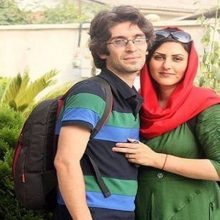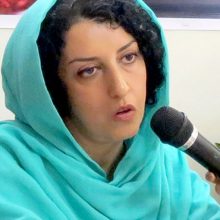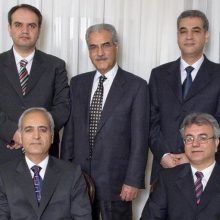Source: www.iranwire.com
Iranian Foreign Minister Javad Zarif is set to attend the 71st United Nations General Assembly in New York this week, where he will likely hold court for the international press on the sidelines of the General Debate, which runs from September 20th to 26th. Audiences can expect Zarif to promote a novel image of Iran as an attractive destination for foreign investors and a leading opponent of Islamic State-style terrorism. Zarif will likely talk, too, about human rights: about how he has taught the subject at Tehran University, how all countries can improve their human rights records, and why UN member states should not misuse the cause for political ends. Zarif’s sound bites on the subject are so well honed compared to his predecessors’ that he will probably charm the uninitiated into quiescence.
But Zarif’s audiences should know that Zarif is not his own man. Nor does he represent only the administration of President Hassan Rouhani. Iranian Supreme Leader Ali Khamenei will have pre-approved just about every statement he makes. Zarif is constrained by a tight script and, as past incidents have shown, tends to fumble whenever he is asked to address specific cases. Earlier this year, for example, when an Iranian human rights activist in Oslo queried Zarif about the cases of several political prisoners, he retreated to a clumsy talking point about Iran’s voter turnout. He then accused his countryman of “Iran-phobia.”
While journalists can’t possibly do justice to the case of every Iranian prisoner of conscience, they would do well to press Zarif on a few representative cases. Here, IranWire offers its own suggestions.
Nazanin Zaghari-Ratcliffe
Over the past few years, Iran has become a risky destination for Iranian dual nationals, who Iranian authorities sometimes detain on vague or unstated charges, and use as diplomatic leverage against their country of abode.
Last month, an Iranian court sentenced British-Iranian charity worker Nazanin Zaghari-Ratcliffe to five years in prison on secret charges. Zaghari-Ratcliffe, a project manager at the Thomson-Reuters Foundation — which is separate from the news organization — was arrested in April while on a family visit to Iran with her two-year-old daughter Gabriella.
Authorities have held Zaghari-Ratcliffe in solitary confinement for extended stretches in high security wings of Kerman and Evin prisons, and have confiscated her daughter’s passport, forcing the child to remain with relatives.
“The simple question to ask Zarif is what his government is doing to solve Nazanin’s and Gabriella’s case,” says Richard Ratcliffe, Nazanin’s husband.
“Is he not shocked by their treatment and shocked that a mother and baby could be held by the Revolutionary Guards as a political bargaining chip with the UK?” Ratcliffe also casts doubt on Zarif’s rebranding of Iran as a country that is open for business. “If Iran is planning on encouraging all this new business, how can it guarantee safety for visitors with this level of unaccountable action against a mother and a baby?”
“The cases of detained dual nationals are of great importance,” says Hadi Ghaemi, director of the International Campaign for Human Rights in Iran. “These detentions run contrary to Zarif and Rouhani’s promises to the diaspora, inviting them back and asking them to engage with their country.”
Arash Sadeghi
In the late 1990s and early 2000s, there was immense excitement surrounding a renaissance of Iranian civil society, which President Mohammad Khatami cautiously encouraged. While a resentful Iranian security establishment made it risky for Iranians to raise their voices over social causes even then, the atmosphere darkened dramatically during the presidency of Mahmoud Ahmadinejad, and especially after the contested presidential election in 2009. But that doesn’t mean all Iranians are keeping quiet. It just means that those who speak up can face grave consequences.
In September 2014, Iranian authorities arrested Arash Sadeghi and his wife, Golrokh Ebrahimi Iraee. They objected to Sadeghi’s Facebook posts about Iran’s human rights record, and his communications with journalists and high profile human rights defenders such as imprisoned activist Narges Mohammadi and Ahmed Shaheed, the UN’s special rapporteur on human rights for Iran. They also disapproved of Sadeghi’s participation in human rights-related gatherings, such as a meeting to protest the execution of a political prisoner, Gholamreza Khosravi Savadjani. Sadeghi reports that authorities kicked, punched, slapped and choked him while he was in custody, and threatened to execute his wife, whose cries he could hear from his solitary confinement cell. They also denied him access to a lawyer. Iraee has since been released on bail, but last August, Tehran’s Revolutionary Court sentenced Sadeghi to 15 years in prison.
“Iranian authorities have significantly intensified the repression against civil society activists and human rights defenders, carrying out arbitrary arrests and detentions, and issuing harsh prison sentences,” says Raha Bahreini of Amnesty International. “Court verdicts issued against these activists have explicitly mentioned clearly peaceful activities as evidence of involvement in ‘criminal’ activities threatening ‘national security.’”
Mahmood Amiry-Moghaddam of Iran Human Rights has tried raising Sadeghi’s case with Zarif before. “I asked, ‘How secure and stable can a state be which cannot tolerate peaceful activities?’ He didn’t answer.”
The Seven Baha’i Leaders
When Ayatollah Ruhollah Khomeini established an Islamic theocracy in Iran in 1979, he afforded limited – but not equal – recognition to some of Iran’s religious minorities, notably Christians, Jews and Zoroastrians. But Iran’s largest religious minority, the Baha’is, remains both unrecognized and persecuted. Baha’is are not allowed to pursue post-secondary education and face economic and employment discriminationthroughout Iran. People seeming to act on behalf of Iran’s security forces frequently vandalize Baha’i cemeteries.
Iranian officials say the Baha’i faith is not a religion but a political movement created by imperial powers. Authorities have imprisoned 81 members of the faith, all of whom, according to the Baha’i International Community, are held on false charges related to their religious beliefs. Among these are seven Baha’i leaders: Fariba Kamalabadi, Mahvash Sabet, Jamaloddin Khanjani, Afif Naeimi Saeid Rezaei, Behrouz Tavakkoli and Vahid Tizfahm. In 2010, Tehran’s Revolutionary Court sentenced them to 20 years in prison on charges including “espionage for Israel,” “insulting religious sanctities” and “propaganda against the system.” Amnesty International called their trial unfair and the charges baseless. UN Secretary General Ban Ki Moon has raised his concern over the case.
Diane Alai of the Baha’i International Community suggests the following question for Zarif: “The seven Iranians who were managing the affairs of the Baha’i community in Iran are still in prison, serving the ninth year of an unjust sentence based on trumped-up charges. They did not receive the protections afforded to them under Iranian law for their trial; now, can we at least expect their warranted conditional release in the near future?”
Under the Iranian Penal Code, Alai points out, individuals who have served either one third or two thirds of their sentence are entitled to conditional release.
Zarif has rarely been challenged over Iran’s treatment of the Baha’is.
Narges Mohammadi
As Javad Zarif has honed his line on human rights in Iran – whether at Tehran University or on the international stage – he has eclipsed Iran’s real human rights leaders. When he boasts of his own human rights credentials, his audiences should compare his commitment to the cause that of Iranians now in prison for their human rights work.
One of the more chilling examples is the case of the anti-death penalty activist Narges Mohammadi. Mohammadi was first arrested in 2011 and imprisoned in 2012 over her involvement in Iran’s Defenders of Human Rights Center, where she had worked alongside 2003 Nobel Peace Laureate Shirin Ebadi before Ebadi went into exile in 2009. Mohammadi was charged with “propaganda against the state” and acting against national security. She was released on medical grounds after several months, as she suffers from a neurological disease that causes partial paralysis. But in 2015, she was re-arrested. This May, she was sentenced to an additional 16 years in prison for her involvement in an anti-death penalty campaign called LEGAM (Step by Step Against the Death Penalty). Mohammadi has had limited access to medical care, and has resorted to a hunger strike to demand permission to communicate with her two children.
Roya Boroumand of the Abdorrahman Boroumand Foundation points out that Iran has the highest per capita rate of executions in the world, and yet dismisses the efforts of critics from outside or exiled human rights groups to investigate the matter. “I would ask Zarif, how can Iranians prevent the execution of innocents or show their opposition to the death penalty if those who raise awareness peacefully, such as Narges Mohammadi, are harassed, detained, and sentenced to long prison terms?”
Champion of Human Rights or Shield for the Revolutionary Guards?
Zarif’s defenders are quick to point out that he and the Rouhani government he serves do not carry out most of the human rights abuses in Iran, which are usually attributable to the Revolutionary Guards and the judiciary. Even so, Zarif likes to boast of Iran’s high voter turnout, and the Rouhani government came into office promising to defend Iranians’ rights and freedoms.
“It is clear that his government has failed to keep its promises,” says Hadi Ghaemi of the International Campaign for Human Rights in Iran. “Zarif acts as a shield for all these organizations who commit gross violations. In the case of imprisoned dual nationals and the ongoing repression of journalists and civil society, Zarif’s foreign ministry has not cooperated with UN human rights mechanisms. Zarif should not provide a shield for the Revolutionary Guards and the judiciary by denying realities on the ground.”




Leave a Reply